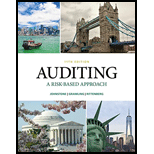
a)
Introduction:Meaning of Management Integrityisthe attitude of management towards Internal
To Define:Management Integrity and its influence over auditors’ decision on the type of audit evidence required. To find out possible sources of audit evidence and management’s ethics on finding out the misstatement that could impact their financial planning
b)
Introduction: Meaning of Management Integrity is the attitude of management towards Internal Control systems and setting the example to the lower set of employees.
To Define: The various possible sources of evidence which may be used by the Auditor to assess the management integrity.
c)
Introduction: Material misstatement is false information in financial statementswhich could affect the financial decisions of a person who relies upon the statement.
To Define: That if Management is refusing to correct a statement , which has been pointed out by the auditor and the impact of this misstatement is impacting the correct income of the organization and its relation with the analyst’s prediction based on the books of the client.
d)
Introduction:Management Integrity is an important parameter of the client’s risk structure and provides the base of internal control. Hence,the auditorshould carefully examine the management integrity in order to judge the credibility of evidence supplied by the management.
To Examine: The various scenarios and to study the negative impact on management integrity the related effect on the audit planning.
Trending nowThis is a popular solution!

Chapter 7 Solutions
Auditing: A Risk Based-Approach (MindTap Course List)
- A company carries an average annual inventory of $8.3 million if it estimates the cost of capital is 11% so much costs are 7% and risk calls are 12%. What does it cost per year to carry this inventory?arrow_forwardI need help with this solution and general accountingarrow_forwardSolve this financial accounting problemarrow_forward
- What is the amount of sales that will be necessary?arrow_forwardI am trying to find the accurate solution to this general accounting problem with appropriate explanations.arrow_forwardUsing Excel showing all work and formulas to compute the following How can I Compute the net present value of each project. Rounding computations to 2 decimal points. And Compute the approximate internal rate of return for each project. Round your rates to 6 decimal points Base on this Scenario: Dwight Donovan, the president of Donovan Enterprises, is considering 2 investment opportunities. Because of limited resources, he will be able to invest in only 1 of them. Project A is to purchase a machine that will enable factory automation; the machine is expected to have a useful life of 4 years and no salvage value. Project B supports a training program that will improve the skills of employees operating the current equipment. Initial cash expenditures for Project A are $400,000 and for Project B are $160,000. The annual expected cash inflows are $126,000 for Project A and $52,800 for Project B. Both investments are expected to provide cash flow benefits for the next 4 years. Donovan…arrow_forward
 Auditing: A Risk Based-Approach (MindTap Course L...AccountingISBN:9781337619455Author:Karla M Johnstone, Audrey A. Gramling, Larry E. RittenbergPublisher:Cengage Learning
Auditing: A Risk Based-Approach (MindTap Course L...AccountingISBN:9781337619455Author:Karla M Johnstone, Audrey A. Gramling, Larry E. RittenbergPublisher:Cengage Learning Auditing: A Risk Based-Approach to Conducting a Q...AccountingISBN:9781305080577Author:Karla M Johnstone, Audrey A. Gramling, Larry E. RittenbergPublisher:South-Western College Pub
Auditing: A Risk Based-Approach to Conducting a Q...AccountingISBN:9781305080577Author:Karla M Johnstone, Audrey A. Gramling, Larry E. RittenbergPublisher:South-Western College Pub- Business/Professional Ethics Directors/Executives...AccountingISBN:9781337485913Author:BROOKSPublisher:Cengage



